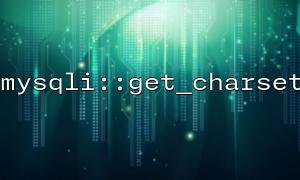When developing web applications, setting the database character set is a crucial aspect. It directly affects whether data is stored, queried, and displayed correctly. In MySQL, character set settings exist at multiple levels: client, connection, result, and database. This article explains the hierarchical structure of MySQL character set settings through PHP’s mysqli::get_charset method to help developers better understand and manage character set configurations.
MySQL’s character set configuration includes the following levels:
Client Character Set: Refers to the character set used when data is transmitted between the application (client) and the database.
Connection Character Set: Refers to the character set setting of the database connection, which determines the encoding format of data sent from the client to the server.
Result Character Set: Refers to the character set used when query results are returned to the client.
Database Character Set: Refers to the character set setting of the database itself, affecting the encoding of data stored internally.
Understanding these levels helps avoid character set inconsistencies during development, ensuring data is stored and queried correctly in the database.
In PHP, you can use the mysqli::get_charset method to get the character set information of the current MySQL connection. This method returns an object containing the character set name and related details.
<?php
// Create MySQLi connection
$mysqli = new mysqli("localhost", "username", "password", "database_name");
<p>// Check if connection is successful<br>
if ($mysqli->connect_error) {<br>
die("Connection failed: " . $mysqli->connect_error);<br>
}</p>
<p>// Get character set information<br>
$charset_info = $mysqli->get_charset();</p>
<p>// Output character set information<br>
echo "Current character set: " . $charset_info->charset . "<br>";<br>
echo "Default collation for the character set: " . $charset_info->collation . "<br>";</p>
<p>// Close connection<br>
$mysqli->close();<br>
?><br>
In this example, the get_charset method returns an object that includes the character set and collation currently used by the connection. The returned information includes:
charset: The character set of the current connection (e.g., utf8mb4).
collation: The collation rule of the current character set (e.g., utf8mb4_unicode_ci).
The client character set is the encoding format used when the client program communicates with the database server. It can be set using mysqli_set_charset(). For example:
$mysqli->set_charset("utf8mb4");
The connection character set is the setting for the database connection that affects the encoding of data transmitted from the client to the server. Usually, after the connection is established, MySQL server’s character set is used by default, or the client can adjust it using the SET NAMES statement.
$mysqli->query("SET NAMES 'utf8mb4'");
The result character set refers to the encoding used when query results are returned to the client. When executing queries, the returned data is encoded with this character set. If the client and connection character sets are consistent, the result character set usually matches automatically.
The database character set is the character set configuration of the database itself. It affects how characters are stored in tables and columns. You can specify the character set when creating the database, for example:
CREATE DATABASE my_database CHARACTER SET utf8mb4 COLLATE utf8mb4_unicode_ci;
This creates a database that uses the utf8mb4 character set with the utf8mb4_unicode_ci collation.
To prevent garbled text or data loss during data handling, it’s crucial to ensure consistency across the MySQL connection, client, query results, and the database’s character sets. The mysqli::get_charset method helps check the current connection’s character set, and other methods allow adjusting character set settings at different levels.
This article has detailed the hierarchical structure of MySQL character set settings through the mysqli::get_charset method, covering client character set, connection character set, result character set, and database character set. Understanding these layers will help developers set and manage character sets properly in their applications, avoiding common character set issues. Maintaining character set consistency in PHP and MySQL web development enhances the stability and reliability of applications.















